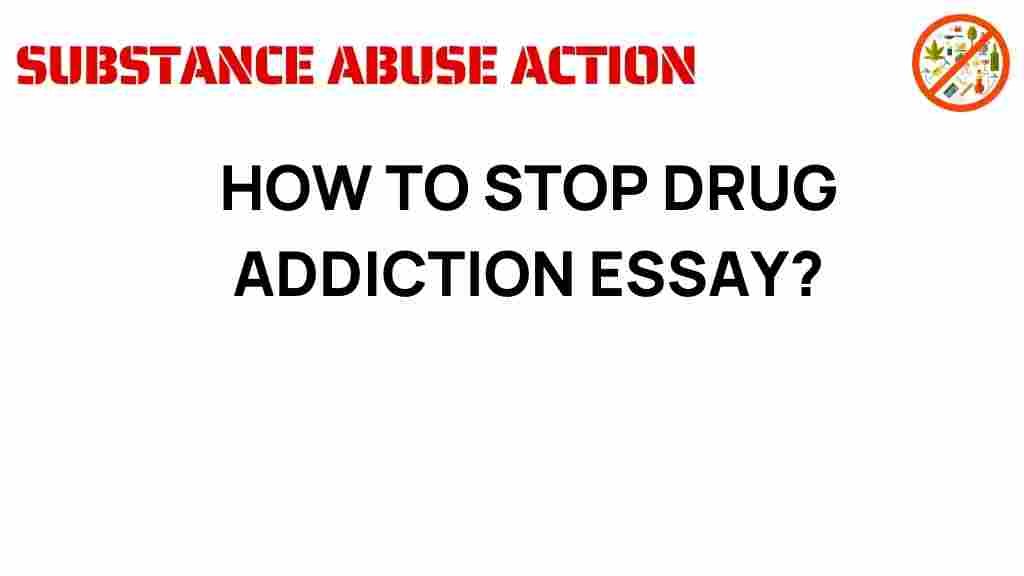Unlocking Freedom: Strategies to Overcome Drug Addiction
Drug addiction is a complex condition that affects many individuals and their families. The journey to recovery can be daunting, but with the right strategies and support systems in place, overcoming drug addiction is possible. This article will explore various recovery strategies, treatment options, and coping mechanisms to help individuals regain control of their lives and achieve lasting sobriety.
Understanding Drug Addiction
Before diving into recovery strategies, it’s essential to understand what drug addiction is. Drug addiction, or substance use disorder, is a medical condition characterized by an inability to stop using a substance despite its harmful consequences. It can affect anyone, regardless of age, gender, or background, and is often linked to mental health issues.
Recognizing the signs of drug addiction is the first step toward seeking help. Common signs include:
- Increased tolerance to the substance
- Withdrawal symptoms when not using the drug
- Neglecting responsibilities at work, school, or home
- Loss of interest in activities once enjoyed
- Continued use despite negative consequences
Recovery Strategies to Overcome Drug Addiction
Successfully overcoming drug addiction often involves a multifaceted approach. Here are some effective recovery strategies:
1. Acknowledge the Problem
The first step in overcoming drug addiction is acknowledging that there is a problem. This self-awareness can lead to a desire for change and motivate individuals to seek help.
2. Seek Professional Treatment
There are numerous treatment options available for drug addiction, ranging from outpatient programs to inpatient rehabilitation facilities. It’s crucial to find a program tailored to individual needs. Treatment can include:
- Detoxification
- Counseling and therapy
- Medication-assisted treatment
- Support groups
3. Develop a Support System
Support systems play a vital role in recovery. Surrounding oneself with positive influences can provide encouragement and accountability. Consider involving:
- Family and friends
- Support groups, such as Narcotics Anonymous (NA)
- Therapists and counselors
4. Focus on Mental Health
Many individuals struggling with drug addiction also face mental health issues. Addressing these underlying problems through therapy or medication can significantly improve the chances of recovery. Common mental health conditions linked to addiction include:
- Anxiety disorders
- Depression
- Post-traumatic stress disorder (PTSD)
5. Implement Prevention Methods
Preventing relapse is a crucial aspect of recovery. Developing healthy habits and coping mechanisms can help individuals resist the urge to return to substance use. Some effective prevention methods include:
- Identifying triggers and avoiding them
- Practicing mindfulness and stress reduction techniques
- Maintaining a healthy lifestyle through nutrition and exercise
Step-by-Step Process for Recovery
Embarking on the path to recovery can feel overwhelming. Here’s a step-by-step process to guide individuals through their journey:
Step 1: Assessment
Assess the severity of the addiction and seek professional help. An assessment by a qualified professional can provide insight into the appropriate treatment options available.
Step 2: Create a Recovery Plan
Work with a treatment provider to develop a personalized recovery plan that outlines specific goals and objectives tailored to individual needs.
Step 3: Engage in Treatment
Participate actively in the chosen treatment program. This may include therapy sessions, support groups, and medical treatment as necessary.
Step 4: Build Coping Mechanisms
Learn and practice coping mechanisms to handle stress and triggers. Techniques such as deep breathing, journaling, or engaging in hobbies can be beneficial.
Step 5: Establish a Relapse Prevention Plan
Work on a relapse prevention plan that includes strategies for dealing with cravings and identifying potential triggers. This plan should be revisited and adjusted as needed.
Troubleshooting Common Challenges
Throughout the recovery journey, individuals may encounter various challenges. Here are some common issues and tips to overcome them:
Challenge 1: Cravings
Cravings can be intense, especially in the early stages of recovery. To manage cravings:
- Engage in physical activity to distract from urges.
- Practice mindfulness or meditation.
- Reach out to a support person or therapist for guidance.
Challenge 2: Relapse
If a relapse occurs, it’s crucial not to feel discouraged. Instead, consider the following steps:
- Reflect on what led to the relapse.
- Reassess the recovery plan and make necessary adjustments.
- Seek support from friends, family, or support groups.
Challenge 3: Stigma
Dealing with the stigma associated with drug addiction can be challenging. To combat this:
- Educate yourself and others about addiction as a disease.
- Engage with supportive communities that understand the struggles of addiction.
- Focus on personal progress and healing rather than external judgments.
Additional Addiction Resources
There are numerous addiction resources available for individuals seeking help. Some reputable organizations include:
- Substance Abuse and Mental Health Services Administration (SAMHSA)
- Narcotics Anonymous (NA)
- Alcoholics Anonymous (AA)
These organizations provide valuable information, support groups, and resources for individuals struggling with addiction and their families.
Conclusion
Overcoming drug addiction is a challenging but achievable goal. By utilizing effective recovery strategies, treatment options, and support systems, individuals can reclaim their lives and find freedom from addiction. Remember, the journey to recovery is unique for everyone, and seeking help is a sign of strength. If you or a loved one is struggling with drug addiction, reach out to addiction resources and take the first step toward a healthier, sober life.
This article is in the category Recovery and created by SubstanceAbuseAction Team

1 thought on “Unlocking Freedom: Strategies to Overcome Drug Addiction”